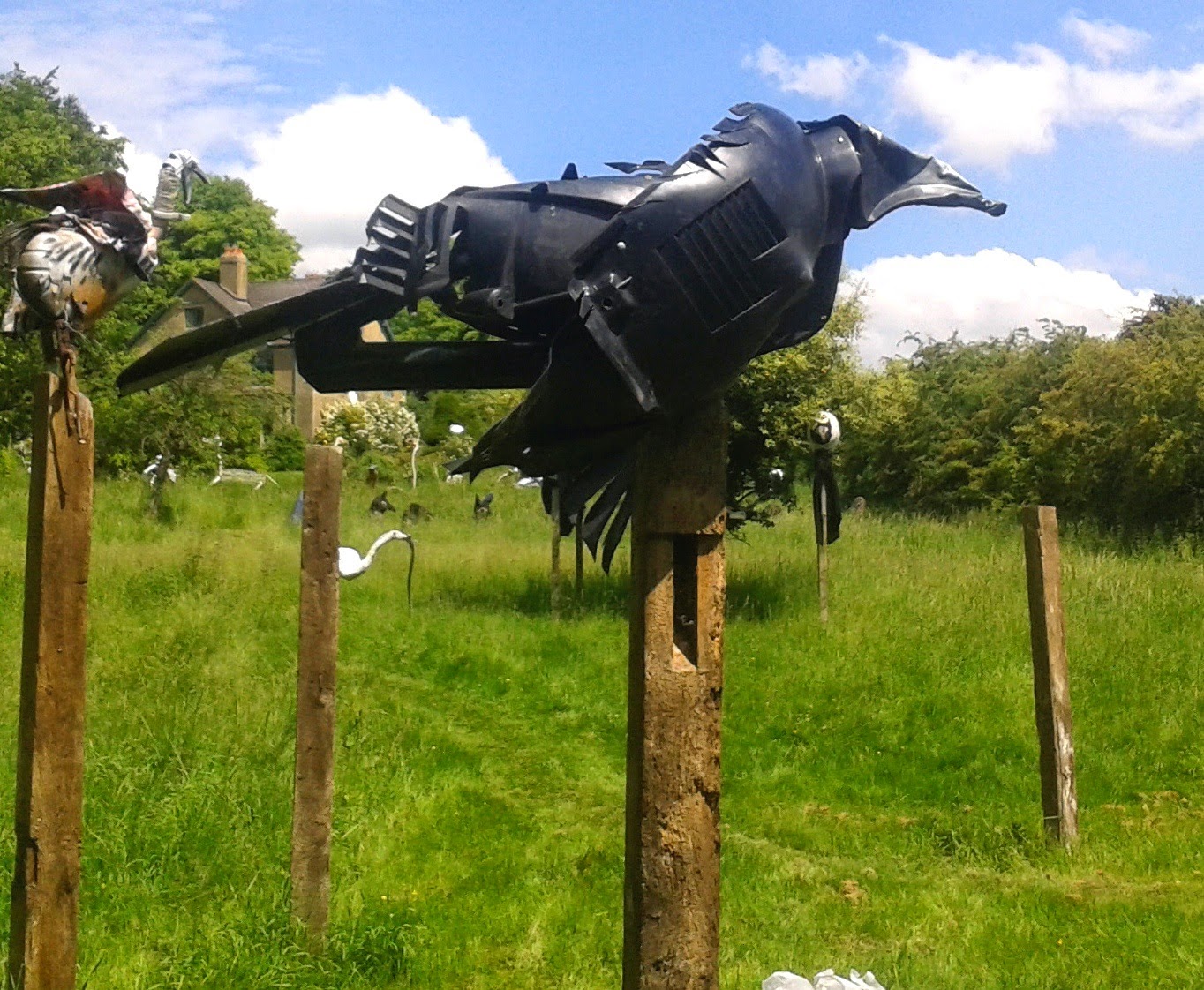Bird Henge was created by the Scraptors Sculpture Group in 2014 and is close to a public path and visible from it at all times. It is located at Bunters belonging to Anthony Wilson one of the members.. He and his fellow Scraptors Paul Boswell and Rachel Macleay specialize in themed sculpture trail making sculpture mainly with recycled materials. The Bird Henge and this accompanying Bird Henge Ramblers Trail received a grant from the Cranborne Chase and West Wiltshire Downs Area of Outstanding Natural Beauty. Bunters is on the edge of that area which stretches south and east.The property is named not after the fat schoolboy but is an old place name; there was a small field here as long ago as 1774 called Bunter's Field. Bird Henge contain Wiltshire birds and some imaginary mythical ones. A procession of high priests and humanoids with bird like heads processes through the Henge. Below a Great Bustard which has been re-introduced on Salisbury Plain since 2004 in the Great Bustard Project. This is the world's heaviest flying bird. It was hunted to extinction in the 1840's in this area, its last stronghold in England.
Below Scraptors Rachel and Paul at work on the Great Bustard
Below a Barn Owl.They have suffered from a lack nesting sites in rotten tree stumps and the like. A programme of installing artificial nests particularly on the huge Ministry of Defence estate has helped their recovery in the although some very long cold periods and a very wet winter has set that back. A TV satellite dish provided the head for this owl.
 Above a Lapwing or Peewit. The latter name recalls its plaintive cry that used to be common in the county when there were big flocks on ploughed fields.In October 1971 a flock of 11,000 was recorded near Tilshead on Salisbury Plain..Nowadays it was a rare event when 390 were seen at Langford Lakes down the Valley. Changing farming methods have reduced their numbers. The head for the Lapwing has a kettle as a base and the body car wheel arches.
Above a Lapwing or Peewit. The latter name recalls its plaintive cry that used to be common in the county when there were big flocks on ploughed fields.In October 1971 a flock of 11,000 was recorded near Tilshead on Salisbury Plain..Nowadays it was a rare event when 390 were seen at Langford Lakes down the Valley. Changing farming methods have reduced their numbers. The head for the Lapwing has a kettle as a base and the body car wheel arches.
The Little Egret has spread recently into the Wylye Valley via France.The first record of one in Wiltshire was in 1992,They are now permanent residents.They can be spotted near Bird Hernge.The body of the sculpture was the petrol tank of a Yamaha RD350 motorbike and was made for the Scraptors' sculpture trail at Stourhead, the National Trust property in Wiltshire in 2011 where it stood in one of the lakes (see below).
The Raven is now quite widespread again in Wiltshire and southern England; its population was once confined to remote mountain areas in Wales and remote seaside cliffs..
A mythical bird above and Below a Red Kite. They are common in Savernake Forest in the north of the county and can sometimes be seen locally. Their forked tales are their give away distinctive feature.

Bird Henge is at Bunters, a place name going back to the eighteenth century. It was occupied by Heytesbury Camp in World War 1 which stretched both sides of the A36. The northern part remains as Knook Camp. The postcard below was customized with the names of camps all over the UK.
Below soldiers at Heytesbury Camp in World War 1
Below a member of the Royal Field Artillery is visited by his parents at Heytesbury Camp in World War1
Below an officer of the Royal Field Artillery at Heytesbury Camp in World War 1
Below a military band marches in Heytesbury in World War 1
Australasian soldiers, Aussies and Kiwis, pose with weapons of war in Heytesbury Camp in 1915.
Note horses in background.










 T
T






No comments:
Post a Comment